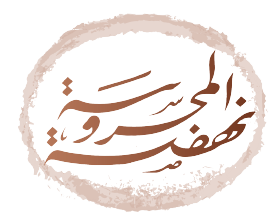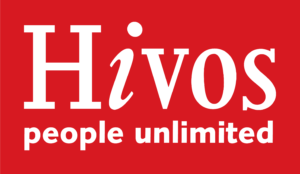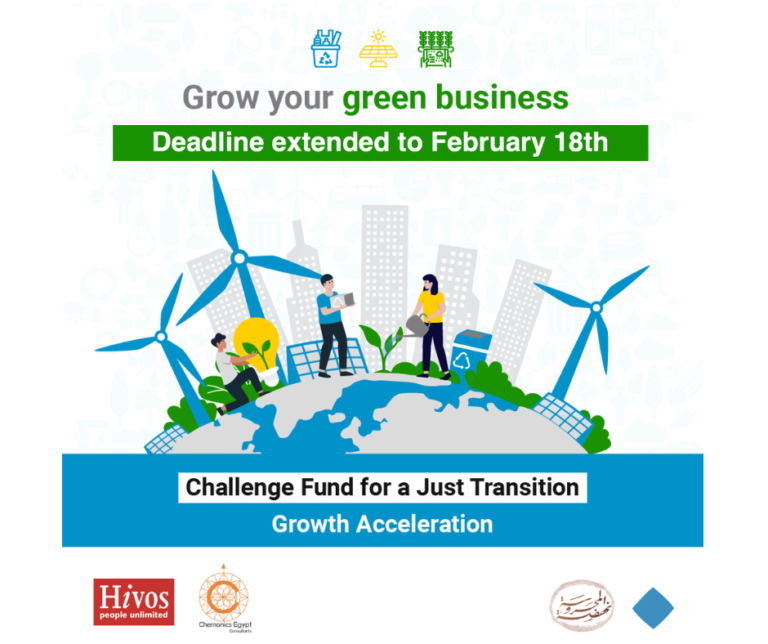



About the Program
Challenge Fund for a Just Transition (CFJT) is a program Funded by Hivos and implemented in Egypt by Nahdet el Mahrousa and Chemonics.
CFJT aims to contribute to climate change adaptation and mitigation efforts by creating sustainable, decent jobs for more than 10,000 young women and men through the green transition process in countries across North Africa, particularly in Egypt, Tunisia, Algeria, and Morocco.
To this end, the outcomes of the programme are: (1) enable 25 Small and Growing Businesses (SGBs) contributing to the green transition and their micro clusters to scale their businesses (2) increase the technical capabilities and financial resources of SGBs and local intermediaries to leverage more commercial and non-commercial financing, and (3) incentivize systemic change towards decent and inclusive employment by providing evidence-based, proven, business cases highlighting the commercial opportunities of a just and green transition.
CFJT aims to deliver a growth management program for 25 green firms. The program’s main objective is to assist those firms in adapting their strategy, business model and operations to achieve scalability and a sustained rapid growth.
For the 2024 round, four Small and Growing Businesses (SGBs) will be selected for this year’s acceleration round.
Time left until deadline
Benefits and Services
The program provides business and technical support through Nahdet El Mahrousa and Chemonics Egypt, respectively. This support encompasses capacity-building workshops, consultations, and technical assistance from top sector experts in both technical and business domains. The assistance offered will include:
1
Developing the strategic growth plans for the business.
2
Non-equity Impact investment funding* of up to 350,000 EGP, structured on an asset- and milestone-based approach.
3
Diagnosis of business operations for development
4
Enhancing performance, quality control, and assurance.
5
Re-designing or developing the SGBs’ business models and operations to facilitate sustained growth and scalability.
6
Networking with key market players, including potential clients, suppliers, NGOs, universities, and other essential stakeholders.
7
Collaborative opportunities with the four countries of program operation (Egypt, Tunisia, Algeria & Morocco)
8
Providing support on environmental impact reporting.
9
Project development and account management support provided by the NM incubator team.
10
Access to financial, legal, HR, and digital marketing consultations at discounted rates through Nahdet El Mahrousa BSU Service
*non-equity Impact Investment Funding: the ticket size is up to 350k. EGP SGBs commit to designate the maximum percentage allowed by law in CSR contribution to Nahdet el Mahrousa.
SGBs Eligibility Criteria
SGBs: Small and Growing Businesses
1
SGBs with a demonstrated revenue track record of selling products or services that contribute to reducing carbon emissions, enhancing climate resilience, or addressing climate adaptation, such as sustainable agriculture and food production, recycling and waste management, sustainable water management (efficient irrigation, desalination, waste-water reuse), renewable energy, sustainable transportation, eco-tourism, and resource efficiency.
2
Demonstrated year-on-year revenue growth potential.
3
Employment of 10 – 50+ direct and indirect labor, with a clear plan to increase employment (aiming for at least 30% additional direct and indirect labor within 2 years). (Preference will be given to applications with the highest numbers.)
4
Integrated micro-businesses in the supply chain, including micro suppliers and distributors, small enterprise customers, and service providers.
5
6
Commitment towards improving the current jobs within the firm (i.e., offering training to current employees, job promotions, etc.)
7
Commitment toward inclusion of women and youth (particularly in recruitment of staff, senior managers, and board members)
8
Commitment of the Managers and the Founders towards the growth management program: attending all sessions, actively engaging in all sessions, and responding to emails/ phone calls in a timely way.
Key Dates
Online application period opens |
Online application Deadline |
One-on-one in-depth meetings with semifinalists.
Panel and startups Pitching
Selection of 4 startups
Program kick-off, beginning with inductions and followed by needs assessments for each startup.
How to Apply?
Fill in the application form (English or Arabic) and submit it before 11:59 PM on the 18th of Feb 2024.
For questions or further inquiries, please contact apply@nahdetelmahrousa.org
Make sure you stay updated with our latest news and activities through our Facebook page
Info Session of the Previous Year
Glossary
Carbon emissions: is a by-product of burning fossil fuels (such as oil, gas, and coal), of burning biomass, of land-use changes (LUC) and of industrial processes (e.g., cement production). It is the reference gas against which other GHGs are measured and therefore has a global warming potential (GWP)
Climate change mitigation: A human intervention to reduce emissions or enhance the sinks of greenhouse gases. Mitigation measures are technologies, processes or practices that contribute to mitigation, for example, renewable energy (RE) technologies, waste minimization processes, sustainable water management, sustainable agriculture and food production, and public transport commuting practices.
Climate change adaptation: The process of adjustment to actual or expected climate and its effects, to moderate harm or exploit beneficial opportunities.
Climate resilience: The capacity of social, economic, and environmental systems to cope with a hazardous event or trend or disturbance, responding or reorganizing in ways that maintain their essential function, identity and structure while also maintaining the capacity for adaptation, learning and transformation.
Decent jobs: It involves opportunities for work that is productive and delivers a fair income, security in the workplace and social protection for all, better prospects for personal development and social integration, freedom for people to express their concerns, organize and participate in the decisions that affect their lives and equality of opportunity and treatment for all women and men.
Green jobs: are decent jobs that contribute to preserve or restore the environment, be they in traditional sectors such as manufacturing and construction, or in new, emerging green sectors such as renewable energy and energy efficiency. Green jobs contribute to improving energy and raw materials efficiency, limiting greenhouse gas emissions, minimizing waste and pollution, protecting and restoring ecosystems, and adapting to the effects of climate change
Indirect labor: refer to the employment created through economic linkages in the society or jobs that were created because of the change in the situation of the suppliers and distributors of the targeted sector or area
Micro-businesses: businesses which employ fewer than 10 persons.
Micro clusters: A geographic concentration of interconnected businesses, suppliers, distributors, and service providers creating direct and indirect synergies among them
Frequently Asked Question
Does the company have to be physically present in Egypt? (For example an Egyptian enterprise based abroad but has activities in Egypt)
If the company is operating in Egypt, but it is not registered there, the company should have a local partner registered in Egypt for at least one year prior to the application to this call (e.g., Distributor Contract, Joint Venture Agreement etc.).
When answering about the employment situation of the company in the application form, what are the different types of jobs that should be taken into consideration (for example, are seasonal jobs created counted)?
Both full-time and part-time job should be counted.
In which language should the application be filled in?
English or Arabic
What’s the exact maturity level of the company to be eligible for the call for applications? (Idea stage, MVP stage …?)
The call is targeting green small growing businesses registered in Egypt or have operations there via a local partner for at least one year prior to applying to the program, with the following criteria:
- Demonstrated revenue track record of selling products or services that contribute to reducing carbon emissions, enhancing climate resilience or climate adaptation (i.e., sustainable agriculture and food production, recycling and waste management, sustainable water management: efficient irrigation, desalination, waste-water reuse…, renewable energy, sustainable transportation, eco-tourism, resource efficiency), for at least three (3) years
- Demonstrated revenue growth potential year-on-year.
- Employment of at least 10 direct and indirect labor and with a clear plan to increase employment (targets at least 30% additional direct and indirect labor within 2 years)
- Integrated micro businesses in the supply chain (i.e. micro suppliers & distributors, small enterprise customers, service providers)
- Commitment toward inclusion of women and youth (particularly in recruitment of staff, senior managers, and board members)
Ideation stage projects are not eligible for this call.
Who will be in charge of selecting the final candidates (selection committee)?
A selection committee has been set in each of the three countries including Hivos and the implementing partners of the project’s consortium.
When will the selection results be announced and how?
The selection committee in each country will inform the companies about their application state after the end of the selection process. The selection process will start by early March.
Regarding the financial support, how does the exact amount of funding get fixed?
Exact funding amount will be decided after the company is selected, based on: (1) the feasibility of the proposed scale up plan, (2) the results of the needs assessment to be conducted for the selected company, (3) the organizational capacity, and (4) the green decent job creation/improvement potential of the applying company.
About HIVOS

About Nahdet El Mahrousa

Nahdet El Mahrousa (NM) is an Egyptian not-for-profit, non-governmental organization (NPO/NGO) that builds the capacities of organizations to improve and expand their social impact. It does so through a) an incubator program that supports social enterprsies from the idea stages all the way to the growth and scale up phases, b) a capacity building program for NGOs and other civil society organizations, and c) an entrepreneurs’ hub that offers business support services, coworking facilities, and a range of other services like trainings, workshops, events, and networking opportunities.